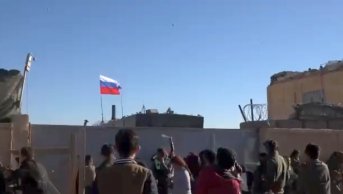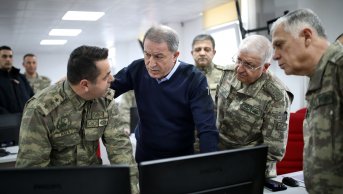Raqqa: A Solution or a Knot?

When the Euphrates Shield Operation began, Turkish officials declared Al-Bab, Manbij and Raqqa, located in the northern Syria, as priority settlements to liberate from ISIS. Al-Bab, the first critical stage of the Operation, has been reached and the city war has begun. It is expected that the city will be liberated from ISISin a shorttime and the Turkish army and the Free Syrian Army (FSA) components it supportswill seize control. In line with the advance of the Euphrates Shield forces to Al-Bab from the north, the Syrian regime forces have started struggling to advance towards Al-Bab from the south. As a result, we have a new situation in which the road between Al-Bab and Aleppo will be the border between the regime and the FSA. This will mean the Euphrates Shieldwill not have any border with the territories under ISIScontrol. Therefore, the new target of the Euphrates Shield may now be theYPG.
In a period when the Turkish army and the FSA approached Al-Bab, the US announced that the Raqqa operation would start in November, 2016. Over the next three months, the Syrian Democratic Forces (SDF)/YPG under auspices of the United States moved from north to the south all along the Euphrates River, and the city centre of Raqqa was surrounded from the north and partly from the west. In the second phase of the Raqqa operation, SDF/YPG intensified their efforts to surround the city from the east. The Raqqa operation of the United States took place just after the Turkish announcement stating that Turkey's next target following Al-Bab and Menbij would be Raqqa. Considering the geographical direction of the YPG operation under US support, it seems that the operation targets removing the border between Turkey-FSA and ISISand prevents them from heading towards Raqqa before they are headed to the east. And as to the second aim,it is to try to gain geographical depth and take control of water resources and dams for a viable and defensible quasi-state, which is the ultimate goal of the YPG. Consequently, both the regime's advance towards Al-Bab and the USA-YPGadvanceto the south along the Euphrates River are to hinder Turkey and the FSAfrom heading directly to Raqqa following Al-Bab and Manbij.
Despite all, it can be said that Turkey's choices on its way to Raqqaare not so dead if we consider its will and the physical circumstances. The development that escalated debates about Raqqa was the telephone conversation of President Erdogan with the US President Trump and CIA Director Mike Pompeo's visit to Ankara. During these talks, one of the main agenda was the plans to liberate Raqqa fromISIS, and the information that the Turkish side offered its concrete plans to the US upon Raqqa had aplace in the press.
Importance of Raqqa for Turkey
The city centre of Raqqa is located in a region relatively far from the Turkish border and it does not constitute an immediate threat. ISIShas no chance of targeting Turkey from there. However, it is very important that Raqqa isliberated from the organization so that ISIS could poseno threats to Turkey. If this can be achieved, ISISwill become an organization completely confined by the Syrian deserts far from the Turkish border, and even if the organizationcontinues to live, it will be kept under control.
The main importanceof Raqqa for Turkey is about who will militarily control the city in a post-ISIS period and what kind of a civilian administration will be established in the city. If Turkey is not included in the process of liberating Raqqa from ISIS, it seems that the citywill be controlled by the SDF which YPG is the main component of, indicating that the US zone of influence under the YPG control will expand further. This situation stands as a big threat for Turkey because if Turkey does not come to the forefront for Raqqa, it thinks that the gap will be filled by a different and more dangerous terrorist organization.
Secondly, since the beginning of the Euphrates Shield Operation, Turkey hasbeen stating that the goal is to "clean up the border regions from terrorism”. There is a dispute between the parties about who is a terrorist and who is not in this region; nevertheless, Turkey has no doubt about the link between the YPG and PKK,andit does not even believe thereexists any difference between them. For this reason, the emphasis of "combat against terrorism" primarily includesthe YPG. Turkey does not find credible the statements of the US and the West that “the Raqqa operation is carried out with the SDF and the YPG elements will withdraw from the city after the city is rescued". The same arguments had been expressed in Manbij and Tal Abyad which have a dominant Arab population, butthe YPG refused to withdraw. In fact, in Tal Abyadand around it, Arabs and Turkmens were subjected to forced migration. More importantly, the YPG struggled to indoctrinate the Arabs in these regions within the framework of the ideology of the PKK. In this regard, one of the most tragicomic incidentstook place in Manbij. Some images regarding how the Arabs in Manbij had recently organized a march named "Freedom forOcalan" reflected in the press. It is known that the education in the regions under the YPG control is also based on the ideology of the PKK, which is completely fed with anti-Turkish elements. These experiences shed light on what could happenif the SDF/YPG takes control of Raqqa, and Turkey does not want to live with generations who nurture enmity towards itselfalongside its southern frontier.
It can be said that Turkey wants to be involved in the Raqqa operation to prevent developments that could plant the seeds of a historical dispute between Arabs and Kurds, and that could bring about long-term instability to the region next to its borders. Turkey demandsa lasting peace in these regions as it is quite vital for its own security, and believes that it is possible through establishment of a fair security and civil mechanism based on local balances. Moreover, this structure in the northern Syria is regarded as a development that will severely weaken Turkey's struggle against the PKK, and in case it acquires a political status,it will threaten the political and territorial integrity of Turkey. On the other hand, Raqqa is vital for the YPG as gaining this city can let it live on its own feet. Turkey wants to prevent this as well. If Turkey is included in the Raqqa operation, it will gain ground in the east of the Euphrates and this ground will be used in the next stage to fight against YPG. For the YPG, Turkey's involvement in the Raqqa operation may mean the loss of the connection between Al-Hasakahand Ayn al-Arab (Kobanî), and return to the tripartite structure that the "cantons" were declared for the first time.
From Turkish perspective, two other significant points regarding Raqqaare related to civilians in the city. Hundreds of thousands of people from Raqqa had to migrate to Turkey when the control of the city passed first to ISISand then to the YPG. Turkey wants to create conditions that will enable these people to return to their homes. Therefore, it seeks for putting an end to ISISand YPG presence, which is the cause of forced migration, and the establishment of a structure based on the control of the local Arabs. Finally, the Raqqa operation is significant in terms of protecting the Turkmen presence that Turkey considers as a relative community, and ensuring the return of those who had to migrate to Turkey back their homes. Turkmens who lost their territories in Bayır-Bucak and Homs do face the same risk in Raqqa. The Euphrates Shield Operationhas become a source of hope for Turkmens in Aleppo and Turkey is sensitive to the protection of Turkmen presence in Raqqa.
Options for the Raqqa Operation
In the current climate, Turkey has limited opportunities in terms of fighting against the YPG inthe east ofthe Euphrates River. The latest steps taken by the YPG and the regime regarding Raqqa and Al-Bab tried to hinder this effort. As the chances of military advancement by the Euphrates Shield have diminished, the new military planning may take the form of advancing to the South, to the city centre of Raqqa, through Akçakale-Tal Abyad. According to the military plans reflected in the Turkish press after the phone conversation between Erdogan-Trump, the ground forces are expected to be formed by the following: Arab elements in the SDF, forces of the Euphrates Shield, and the Turkish and US Special Forces. Coalition forces are also expected to provide aircraft, missiles and support of intelligence. Whether this plan will work or not will depend on how the Trump administration decides to fight againstISIS. From the Turkish point of view, the situation reached to the point where it is impossible for the US to maintain its cooperation with both Turkeyand the YPG. In this respect, it can be said that the new US administration will be obliged to make a choice.
If the US maintains its military engagement with the YPG, two alternativesconcerning Raqqa may arise for Turkey. The first is that despite the US, Turkey can develop an alternative plan based on the Arabs in Raqqa and the forces of the Euphrates Shield. This option seems to be problematic in terms of the risk of confrontation with the US and the efficiency of power to be created. Considering the troubles experienced even in Al-Bab, it seems difficult for Turkey to have a successful result at the end of such an initiative. The second option for Turkey regarding Raqqa is linked to the Astana process. If the Astana process becomes successful and the contradiction between the regime and opposition in Syria can be removed, the cooperation between Turkey and Russia on Raqqa may also be discussed. In this case, the sending of the central forces to Raqqa may be brought to the agenda. The implementation of this option depends on the success of political solution in Syria. Without a solution that would be satisfactory to the opposition and to Turkey, entry of the regime forces into Raqqa would be a new field of competition rather than a field of cooperation.










